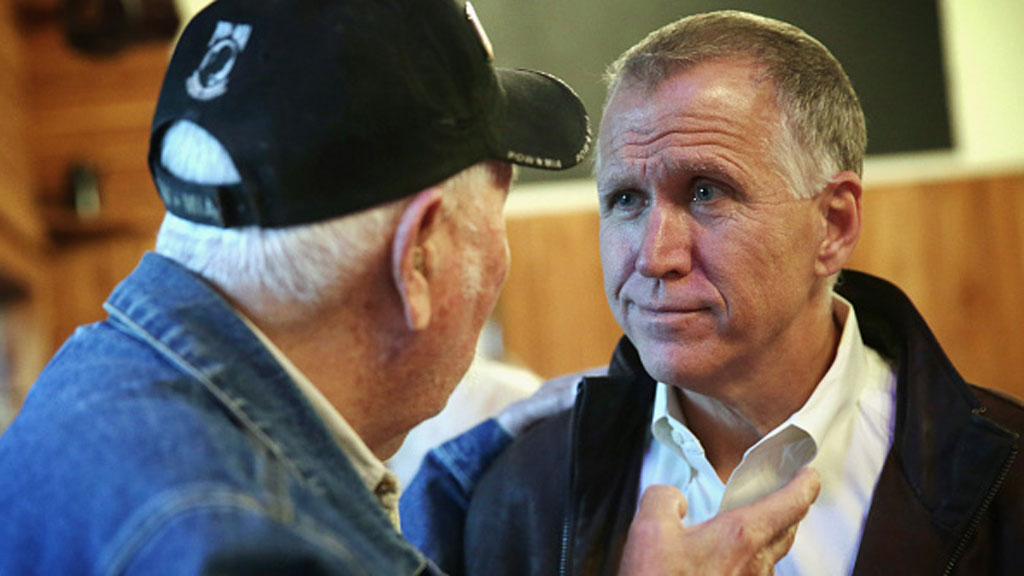North Carolina: the most expensive Senate race in US history
Whoever wins the closely fought senate seat in North Carolina on Tuesday can rest assured it cost only a meager $113, 639,041 – the most expensive senate race in American political history.
Nearly 114 million dollars. It’s a full-fat, hand breaded, jumbo sized, slow roasted, basted in a special sauce, North Carolina kind of bill. A tasty 114 million dollar all-you-can-watch targeted advertising bonanza, cooked up from scratch by two candidates, pitted together in a race that will help decide who controls the US senate.
It’s obscene money, particularly in a race between a Democrat and a Republican desperate to declare their interest in working people. But if election spending is what gets them over the line, it’ll be judged to have been worth it. At least by the winning side.
Of course, it’s not all come from candidate campaign committees. More than twice as much is from outside parties, super pacs, and politically active nonprofit groups, which we’re told by the centre for responsive politics, renders the actual source of the money difficult to identify.
North Carolina
A quick trim in the barber shop in Graham, North Carolina, costs about $5. The barber shop proclaims itself “flat-top specialists”. Indeed, while we’re there, one client is indeed being flat topped, although the barbers joke that it’s a fat top, kind of loose along the sides.
Graham is an atmospheric small town, off Highway 70, with a historic square, and an Art Deco cinema, and a soda shop.
The barber’s is a convivial place. The last owner died aged 102 – and now it’s owned and run by two friends who re-trained to cut hair, when the housing and construction sector collapsed amid the global financial crisis, and robbed them of their careers as civil engineers. Now they live more modestly, work five days a week, and take pride in a shop with original but re-covered seats, and chrome that’s still scratched, as a testament to the salon’s long history.
 Photo: Republican candidate Thom Tillis speaks to voters
Photo: Republican candidate Thom Tillis speaks to voters
It’s the way the North Carolina men who go there prefer. A nod toward the modern, but stolidly anchored in the past. It’s the kind of place the Republican candidate Thom Tillis might expect to feel at home.
But the politics here are nuanced. “Yes, this could be considered a referendum on Barack Obama, but all politics is really local”, we’re told. There’s a need, we’re told, for a political leadership that gets something done. But no-one can think of anyone who’s said they won’t vote, because they’re fed up with Washington politics. They’ll vote, and they’ll most likely vote Republican, mainly because they don’t like the incumbent, Kate Hagan. The hundred million dollar bill spent by both sides on their campaigns is frowned upon.
‘Not impressed’
Over in Greensboro on Government Plaza, they’re not impressed by the record spend on the campaign either. On Monday night, the grass roots movement, Moral Mondays, held their final rally to get out the vote. Begun in protest at deeply conservative policies enacted by the Republican state legislature, they’ve moved their sights to Tuesday’s vote.
No, it’s not about Obama. That’s what the “extremists” want it to be about, we’re told. It’s about holding leaders to account. About ensuring they understand who they represent, and the standards they have to meet. It’s about the minimum wage, medicaid and student tuition, voter suppression and cuts to education.
Most importantly, it’s about ensuring the community makes it to the polls. Much discussion of early buses for working folk, and lifts for neighbours, and car pools and phoning and facebooking and tweeting to make sure people remember their right to vote, and the need for them to exercise that right.
At the other end of the day, North Carolina results are likely to be among the first of the battlefield states. The first of the key six that will determine whether President Obama finishes out his time as the leader of a hostile congress, with the Republicans holding a majority in both houses, or whether the Democrats still hold the Senate.
No doubt there’s a lot to play for. But in a way one result is already clear. Come the next election cycle, a close senate seat just got alarmingly more expensive.
Follow @C4KylieM on Twitter
